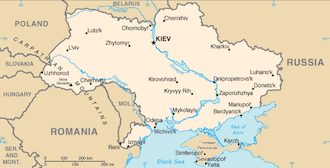Ukraine has been struggling all year to cope with a secessionist movement in the country’s east, brought about by hostile legal changes to the status of the ethnic Russians that dominate those regions. The settlement of this civil war took a step forward, as the Ukrainian parliament voted to grant some autonomy to the breakaway regions.
 A quick reminder of why they didn’t do this obvious thing in the first place, however, saw a violent backlash against the vote by the ultranationalist factions that dominate the country’s far west. They marched en masse against parliament, attacking police. One threw a hand grenade, killing a member of the national guard, and over 100 police were wounded.
A quick reminder of why they didn’t do this obvious thing in the first place, however, saw a violent backlash against the vote by the ultranationalist factions that dominate the country’s far west. They marched en masse against parliament, attacking police. One threw a hand grenade, killing a member of the national guard, and over 100 police were wounded.
The reality is that the Ukrainian government, ever since ousting the pro-Russian party, has relied heavily on nationalist support, and this split sets the stage for a major political shift, as well as the potential for more bloody violence and yet another divide in the country.
Prime Minister Arseney Yatsenyuk made a televised speech slamming the nationalists, declaring them as worse than the “Russian federation and its bandits,” his go-to description of the eastern secessionists, saying the nationalists aren’t just trying to leave the country but destroying it from within.
Yatsenyuk’s comments didn’t end there, either, as in parliament he went after the leader of the far-right Svoboda Party, asking their leader what the difference is between his party and the people attacking parliament outside.
Far-right parties have limited political power right now, but as was shown in the violent protests that ousted the pro-Russian government, and today’s attacks, they wield considerable power in the streets, and their leadership has often threatened to use their militias to impose changes if parliament doesn’t follow through.


